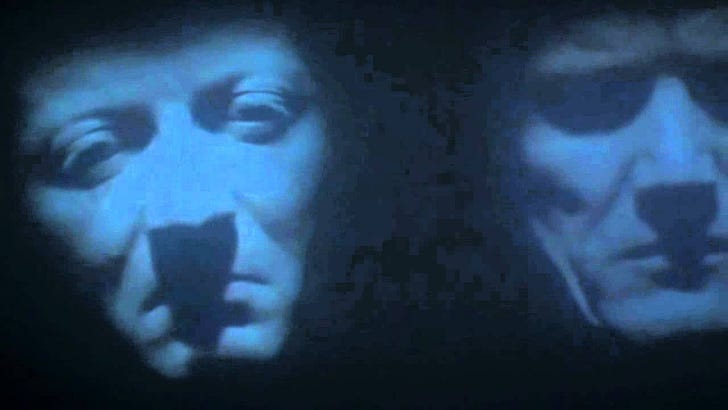This week was about the fragility and ferocity of public-facing truth—how hard it is to get it right, how painful it is to get it wrong, and why it still matters to try anyway.
Each post—whether it’s about a personal financial risk, a journalistic misstep, or a fight for LGBTQ+ rights—wrestles with what happens when private choices, identities, or mistakes are made public, and how much integrity, resilience, and system-awareness it takes to hold space for them honestly.
💭 This Week’s Big Ask:
When you speak with conviction, how do you hold space for the harm you might still cause?
In the 1988 cult film The Big Blue, Jacques Mayol is a world-class diver who can hold his breath longer than seems human. He saves dolphins, slips deeper into the ocean with every dive, and becomes obsessed with the silence and stillness beneath the surface. By the end of the film, he swims out alone into the night—so far and so deep that he disappears, almost becoming a dolphin himself. It’s a haunting, mythic ending. Not quite death. Not quite transformation.
And that’s what this kind of writing feels like sometimes. There’s a diving rig,—a ballast that brings you under—to truth-telling that no style guide prepares you for.
It’s not just writing. It’s free diving.
You inhale. You dive. You chase the beautiful, the essential, maybe even the unreachable. And you hope you have enough oxygen to surface. Sometimes you don’t. Sometimes you resurface changed.
And if you remain drowned, that silence costs more. Always has.
What does it cost—to ourselves, to others, to the system—when we tell the truth out loud, and what does it cost when we don’t? And what does it cost when you get the truth wrong?
These are not rhetorical questions. They’re the sextants behind every essay, every post, every moment you choose to make something private public. A way of finding your position by the angle of what hurts.
So how do we repair? Keep going? And build something honest enough to hold the mess?
For Such a Time as This, Blessed the Makers of Space
New Hampshire has been a leader in advancing LGBTQ+ protections and rights, legalizing same-sex marriage in 2009—something that didn’t even happen at the federal level until 2015—and extending non-discrimination laws to include transgender individuals in 2018—again, something that didn’t even happen at the federal level until 2020, and even that took a …
#GratiTuesday:
Let Them Eat Cake
This week’s GratiTuesday is a little self-serving, but hear me out—it’s for a good reason. My birthday is on March 29th, and what I want this year is cake. Not just any cake, though. I want your favorite, most decadent, over-the-top cake recipes.
Rachel Engelman sent in her absolute favorite cake recipe—Caramel Butter Cake with Fudgy Chocolate Frosting. She reports that’s the cake she bakes for herself on her own birthday.
This Was a Bad Bad Financial Decision (And Eggs Should Be Cheaper)
The Debt Lie: What They Never Told You About Money
🎧 Written in the Glow of a Newsroom at 3am | A Playlist by Coffee with Steve
Luc Besson’s 1988 The Big Blue is about more than freediving. It’s about obsession, isolation, beauty that’s too big to hold, and the pull of something that might save you or drown you, depending on the day. It’s about two men shaped by silence, water, and grief. And one woman caught between their world and the surface. It’s tender, metaphysical. Deeply French, and doesn’t bother to explain itself to anyone. The film only breathes.
Jacques and Enzo both try to live above water—for love, for pride, for fame. But neither belongs there. The surface warps their intentions.
Julia Jacklin’s Don’t Let the Kids Win and Bon Iver’s Re: Stacks inhabit a world where the self is still soft clay. Blue Spotted Tail by Fleet Foxes crystallizes this early tension. The lyric “Why are the lights hung?” echoes Jacques' underwater gaze—wonder without answer, devotion without language. These are songs about innocence made conscious.
The surface world in The Big Blue tries to name things: fame, competition, romance. But for Jacques, language is a violence. Every attempt to explain the ocean—his gift, his obsession—pulls him further from who he is. Love, when filtered through translation, fractures.
Frightened Rabbit’s Poke and Iron & Wine’s Belated Promise Ring speak to the ache of saying too much, or too late. Don’t Swallow the Cap captures the entropy of a mind unraveling under its own narrative weight.
And just like Jacques with Johana, the speaker in these songs cannot be fully known without losing themselves.
The final act of the playlist echoes this with songs like The Lightning I, II by Arcade Fire and The Joke by Brandi Carlile. These are resurrection songs, but they don’t erase what came before. They carry the grief, the beauty, the regret. They sing because of it.
But then come the bonus tracks: Dog Days Are Over, This Year, You Learn, Freedom! ‘90. These aren’t tied to plot. They’re spirit. They’re what happens after the credits.
💬 What’s a song that pulls you under—slow, honest, and all the way down? Hit “Message Steve” and tell me.
Subscribe to the full Coffee with Steve experience here. Or don’t. It’s your inbox—you decide. Pick what you want, skip what you don’t, and keep me around as much (or as little) as you like. I promise, we’ll still be friends.








